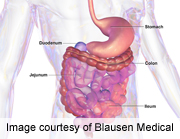
FRIDAY, Aug. 8, 2014 (HealthDay News) — Newly released guidelines for the treatment of irritable bowel syndrome and a type of constipation known as chronic idiopathic constipation reveal a number of proven treatments for these two common conditions.
“There’s a greater variety of approaches which reflect a greater understanding of the disorders,” said guidelines co-author Dr. Eamonn Quigley, chief of the division of gastroenterology and hepatology at Houston Methodist Hospital.
“We now have a better opportunity to improve the lives of our patients,” Quigley said.
The guidelines are published in the August issue of the American Journal of Gastroenterology.
An estimated 5 percent to 15 percent of the world’s population has irritable bowel syndrome, a condition that can cause symptoms such as abdominal pain, diarrhea or constipation, cramping and bloating, and gas. It can affect people at any age but is especially common when people are in their 20s and 30s, Quigley said.
The condition can be difficult to diagnose because other conditions share the same symptoms. Unlike other conditions, however, there’s no specific diagnostic test for irritable bowel syndrome, he noted. Physicians must rely purely on symptoms to make the diagnosis.
The new guidelines, released this week by the American College of Gastroenterology, say there’s evidence to support the following treatments for irritable bowel syndrome:
- Fiber (psyllium especially when compared to bran)
- Probiotics
- An antibiotic called rifaximin (Rifagut)
- Medications known as linaclotide (Linzess) and lubiprostone (Amitiza)
The irritable bowel syndrome guidelines also say that research has boosted the case for using antidepressant medications and psychological therapy.
Probiotics are a hot topic in medicine. Quigley said research supports their use, but it’s not clear which ones are best. “We need more studies comparing doses and preparations, and there hasn’t been a lot of that done,” he said. Still, probiotics are safe and patients tolerate them well, he noted.
“In regards to specifics, patients have to talk to their doctor,” Quigley said.
Dr. William Chey, a gastroenterologist and professor of medicine at the University of Michigan, agreed that it’s difficult to decide which probiotic product to recommend. He said one possibility is the product known as Align, which is widely available.
However, the guidelines indicate that there’s not enough evidence to support the use of prebiotics (components of food that can’t be digested and promote healthy bacteria) and synbiotics (products that combine probiotics and prebiotics).
As for diet, Quigley said there’s some evidence that gluten-free diets and so-called “FODMAP” diets can help reduce symptoms of irritable bowel syndrome. FODMAP diets cut out potentially troublesome foods, such as certain added sugars, and then reintroduce them to the diets of patients to help figure out which ones cause symptoms.
Chey said the guidelines slightly understate the value of treatments that involve changing diet since there’s evidence that “diet plays a role in the development of the condition and has a role in treatment.”
For patients with chronic idiopathic constipation, Quigley said, “there are a lot of relatively simple and relatively inexpensive treatments that work for constipation, and most of them are pretty safe.”
Chronic idiopathic constipation is long-term constipation that doesn’t have a known cause. Approximately 10 percent to 15 percent of the general population suffers from this condition.
The guidelines for chronic idiopathic constipation strongly recommend the use of fiber supplements plus laxatives such as polyethylene glycol (MiraLax), lactulose (Generlac), sodium picosulfate and bisacodyl (Dulcolax).
The guidelines also strongly recommend linaclotide (Linzess) and lubiprostone (Amitiza), which also appear in the recommendations to treat irritable bowel syndrome, and prucalopride (Resolor).
Some of these drugs are available over the counter, Quigley said. Prescription drugs are available for people with more severe cases of constipation, he said.
More information
For more about irritable bowel syndrome, try the U.S. National Institute of Diabetes and Digestive and Kidney Diseases.
Copyright © 2025 HealthDay. All rights reserved.

